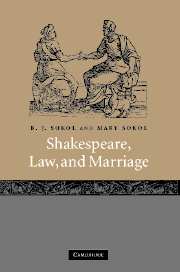Book contents
- Frontmatter
- Contents
- Acknowledgments
- List of abbreviations: Shakespeare titles
- Introduction
- 1 Making a valid marriage: the consensual model
- 2 Arranging marriages
- 3 Wardship and marriages enforced by law
- 4 Financing a marriage: provision of dowries or marriage portions
- 5 The solemnisation of marriage
- 6 Clandestine marriage, elopement, abduction, and rape: irregular marriage formation
- 7 The effects of marriage on legal status
- 8 Marriage breakdown: separation, divorce, illegitimacy
- 9 'Til death us do part
- An afterword on method
- Notes
- Bibliography
- Index
3 - Wardship and marriages enforced by law
Published online by Cambridge University Press: 22 September 2009
- Frontmatter
- Contents
- Acknowledgments
- List of abbreviations: Shakespeare titles
- Introduction
- 1 Making a valid marriage: the consensual model
- 2 Arranging marriages
- 3 Wardship and marriages enforced by law
- 4 Financing a marriage: provision of dowries or marriage portions
- 5 The solemnisation of marriage
- 6 Clandestine marriage, elopement, abduction, and rape: irregular marriage formation
- 7 The effects of marriage on legal status
- 8 Marriage breakdown: separation, divorce, illegitimacy
- 9 'Til death us do part
- An afterword on method
- Notes
- Bibliography
- Index
Summary
MARRIAGES ENFORCED BY LAW
In a few places in Shakespeare's plays a king or ruler orders the marriage of a subject to a particular partner, reflecting legal circumstances unfamiliar to us today. For instance, the marriage of the widow Paulina to Camillo is ordered by Leontes in a sudden turnaround in which Paulina's sixteen years of admonishing Leontes is reversed; this incident begins with the exclamation ‘O peace, Paulina!’ which at last silences her (WT 5.3.136). The disempowering of Paulina may seem retaliatory, comic, anti-feminist, or unduly pre-emptory – and may well have important symbolic and psychological resonances in the play – but in legal terms it corresponds quite closely with the long-disputed rights of kings to marry off the ‘royal widows’ of their nobles.
However, legal powers over wards and royal widows do not explain the enforced marriage of Lucio to the prostitute Kate Keepdown, meted as a punishment to him by Duke Vincentio in Measure for Measure 5.1.506–22. An actual legal correlative with this, up to a point, is found in the church court action of enforcing a marriage following abjuration sub poena nubendi. This action could arise because habitually fornicating couples were sometimes compelled by church courts to ‘abjure’ continuing sexual relations ‘under the penalty of marrying’; that is, they were forced to swear that ‘the next time they had intercourse they would be ipso facto married’.
- Type
- Chapter
- Information
- Shakespeare, Law, and Marriage , pp. 42 - 55Publisher: Cambridge University PressPrint publication year: 2003

